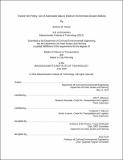| dc.contributor.advisor | John P. Attanucci and Frederick P. Salvucci. | en_US |
| dc.contributor.author | Stuntz, Andrew W. (Andrew William) | en_US |
| dc.contributor.other | Massachusetts Institute of Technology. Department of Urban Studies and Planning. | en_US |
| dc.date.accessioned | 2018-11-28T15:25:32Z | |
| dc.date.available | 2018-11-28T15:25:32Z | |
| dc.date.copyright | 2018 | en_US |
| dc.date.issued | 2018 | en_US |
| dc.identifier.uri | http://hdl.handle.net/1721.1/119275 | |
| dc.description | Thesis: S.M. in Transportation, Massachusetts Institute of Technology, Department of Civil and Environmental Engineering, 2018. | en_US |
| dc.description | Thesis: M.C.P., Massachusetts Institute of Technology, Department of Urban Studies and Planning, 2018. | en_US |
| dc.description | This electronic version was submitted by the student author. The certified thesis is available in the Institute Archives and Special Collections. | en_US |
| dc.description | Cataloged from student-submitted PDF version of thesis. | en_US |
| dc.description | Includes bibliographical references (pages 218-224). | en_US |
| dc.description.abstract | Incremental changes in fare policy can have substantial and long-term impacts on transit ridership and revenue, but they are often driven by near-term revenue needs and determined within short time frames with limited analysis. This thesis proposes a procedural framework to organize analysis of incremental fare changes, linking exploration of current pricing strategies to estimation of behavioral parameters and modeling of fare change scenarios. Within this framework, empirical case studies are presented at two of the five largest transit agencies in the U.S. - the Massachusetts Bay Transportation Authority (MBTA) and the Chicago Transit Authority (CTA). These agencies have increased the price of passes relative to pay-per-use fares in recent years, motivating three particular applications that make extensive use of automated fare collection (AFC) data: 1) differentiating employer-based, pre-tax, automatically-renewing pass sales from other pass sales, 2) estimating cost sensitivity of both ridership frequency and fare product choice using only recent experience at a single agency, and 3) incorporating fare product choice in a traditional elasticity spreadsheet model to predict impacts of fare change scenarios. Passes sold through employer programs and online are found to have lower use than other passes, contributing substantially to revenue while increasing ridership; expanding these programs or extending tax benefits to all transit commuters could further increase revenue and ridership. Individual-level AFC data are used to estimate fare-related behavioral parameters: resulting MBTA elasticity estimates of -0.7 for pay-per-use and -0.5 for employer-based passes are higher than current agency assumptions of -0.25 and -0.15, use of a CTA 30-day or 7-day pass appears to boost a customer's ridership by up to 11% or 21% (respectively), and a CTA product choice model is estimated without reliance on stated preference data. A CTA fare model combining product choice and elasticities predicts substantial switching between fare products when pass multiples are changed, and a simplified model illustrates that passes should be priced below revenue maximization to capture low-cost gains in ridership. The procedural framework in this thesis applies to all transit agencies, and the empirical applications are relevant to agencies that collect AFC data and offer multiple payment structures. | en_US |
| dc.description.statementofresponsibility | by Andrew W. Stuntz. | en_US |
| dc.format.extent | 233 pages | en_US |
| dc.language.iso | eng | en_US |
| dc.publisher | Massachusetts Institute of Technology | en_US |
| dc.rights | MIT theses are protected by copyright. They may be viewed, downloaded, or printed from this source but further reproduction or distribution in any format is prohibited without written permission. | en_US |
| dc.rights.uri | http://dspace.mit.edu/handle/1721.1/7582 | en_US |
| dc.subject | Civil and Environmental Engineering. | en_US |
| dc.subject | Urban Studies and Planning. | en_US |
| dc.title | Transit fare policy : use of automated data to improve incremental decision making | en_US |
| dc.type | Thesis | en_US |
| dc.description.degree | S.M. in Transportation | en_US |
| dc.description.degree | M.C.P. | en_US |
| dc.contributor.department | Massachusetts Institute of Technology. Department of Civil and Environmental Engineering | |
| dc.contributor.department | Massachusetts Institute of Technology. Department of Urban Studies and Planning | |
| dc.identifier.oclc | 1065525444 | en_US |
